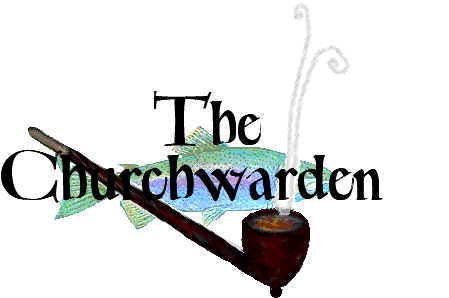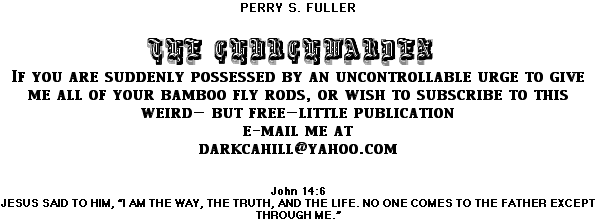
July 2001
~~~~~~~~~~~~~~~~~~~~~~~~~~~~~~~~~~~~~~~~~~~~~~~~~~~~~~~~~~~~~~~~~~~~~~~~~~~~~~~~~~
Published with the belief that God acknowledges no distinction between the secular and the sacred.
~~~~~~~~~~~~~~~~~~~~~~~~~~~~~~~~~~~~~~~~~~~~~~~~~~~~~~~~~~~~~~~~~~~~~~~~~~~~~~~~~~
In this issue:
The first pipe I ever owned was given to me by a Baptist preacher. Amy and I were living in West Virginia at the time, wasting my recently acquired veteran's benefits on the mistaken notion that I had been called to the ministry. The college chosen as preparation for the Lord's work was a fundamentalist institution with distinct leanings towards evangelical Arminianism. Initially, the dogmatic distinctives mattered little because my own position was one of Calminian Dispensationalism (an extremely unstable synthesis of Calvinistic and Arminian soteriology conjoined with Dispensational eschatology) so I fit right in, at least for awhile.
Ultimately, I guess, guilt rests upon my father and mother for our inevitable exodus from the Appalachian Bible Institute (ABI). Half-way through the four year program we had to leave. Standard psychological analysis of any personal crisis usually forces one to lay the fault at his parent's feet, does it not? My mother taught me to enjoy the printed page. She was and remains an avid reader, and by virtue of her encouragement I matured into a serious bookworm as well. My father, on the other hand, chewed on a pipe for many years before he got lazy, turned to cigarettes, and then finally quit altogether. From him I learned to embrace the aroma of burley. Ultimately--and this is no exaggeration--books and briar kept me from graduating. Blame it on Mom and Dad.
Reading can get you into deep doo-doo, trust me. When Christ began saving my soul from sin on March 3, 1976, it was only natural to supplement an unsatiable hunger for well crafted sentences with those written by Christian authors. Providentially, God brought a man to our local congregation who had a particular affinity for Puritan and Reformed writers. Moreover, he was charged with the specific responsibility of maintaining a table full of low cost literature for the edification of the church. Thus, the groundwork for my undoing at ABI was partially laid two years prior to ever tipping a single toe on its lovely property. Mr. Steve Feriante, the bookseller, made the fatal mistake of offering for purchase a volume by Arthur Pink entitled The Sovereignty Of God.
I bought Pink and perused him carefully. Next I discovered Lorraine Boettner's The Reformed Doctrine Of Predestination. Between Pink and Boettner, my short stay as a divinity student (1978-1979) started with a receptivity towards--though not a complete acceptance of--the major tenets of historic Calvinism. By the end of my freshman year I'd be a full fledged "Five-Pointer," and by the summer of 1979 I would be moving to another part of the state.
Enroute to being squeezed out of ABI, I met Don Fortner, a man considerably different than many pastors--meaning he had actually something to say and and what he said made sense. Also, he loved the heath tree root--as evidenced by thirty or more beautiful pieces--which made him even more interesting. Amy and I used to visit Don, us and a handful of like-minded dissidents who did not see eye to eye with the academic authorities. We'd drive up to his house about forty miles away, sit around and converse while he filled the room with blueish curling clouds of Captain Black. Not a lot of people can claim their first pipe was given to them by a Baptist preacher, but I can and it's 100 percent true.
Well, okay, maybe I am tweaking the truth somewhat; the word "gave" does say too much. I practically begged Don for his gift and the Graybow he offered could have been nothing more than a means of shutting my mouth for awhile, a bone for a whining dog if you will.
Smoking is a matter of conscience, being neither condemned nor commended by the Bible. Appalachian Bible Institute had freedom to forbid the use of tobacco on campus, but not elsewhere. Yet I was a fool. I did not appreciate the Christian's liberty properly and pushed the issue with impunity by puffing away in my mobile home which happened to be immobilized on a rock cliff directly above Lester Pipkin's residence. Pipkin was the president. One afternoon he came calling at my door. I tossed the pipe under the sofa when I heard his voice.
"I'm burning leaves down below. Hope the smoke isn't bothering you."
"Oh, not at all, Mr. Pipkin. No sir, not at all!"
I don't believe Lester ever caught me himself, but someone did. Sure enough, I eventually found myself in the dean's office, promising to be a good boy until I got my sheepskin.
The school also took a dim view of neo-orthodoxy. Barth, Bonhoeffer and Brunner were looked upon with great suspicion. I began with Bonhoeffer and never understood the objection to him, but Spurgeon and the Puritans really captured my imagination. However, those dead divines of old unintentionally engineered a collision course with ABI's doctrinal statement by taking me from Dispensationalisn to Covenantalism, from Arminianism to Calvinism. For better or worse Amy followed my progress and it soon became apparent we'd never reach graduation because we were so emphatically in conflict with Fundamentalist ethics and dogma. During the summer of our sophomore year we decided to relocate in Charleston, spending nearly eight miserable years there in physical and spiritual impoverishment before finally heading home to Massachusetts, sweet land of liberalism.
Roughly two decades later, books and briar still manage to get me in trouble. Try justifying a new pipe before your spouse when you already own 20 of them. And today I read everything from Whitefield to Wesley with the result that I see the body of Christ as something significantly larger than a sectarian remnant. Furthermore, I am becoming increasingly suspicious of any closed system theology whose proponents consistently strain the Scriptures through their own prejudicial colander while pretending to be "always reforming." Honest hermeneutics (no longer inspiration or inerrancy) is the foremost issue confronting today's student of the Bible. I once heard a Presbyterian elder sharply criticized for making the observation that "Reformed" and "biblical" were not always synonymous in terms of content. I felt bad for the guy; he was right. Exegesis ought to faithfully follow the text whether or not the results fit neatly within the parameters of our interpretive paradigms. From now on, regardless of the difficulties such an attitude will undoubtedly incur, where the canon truly leads is where I intend to go. Just give me a big bowlful of Latakia for the journey and I'll be happy.


�copyright 2001, Perry S. Fuller
year index
01-01 index
02-01 index
03-01 index
04-01 index
05-01 index
06-01 index

